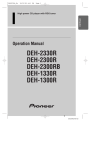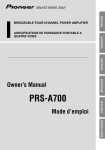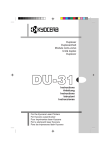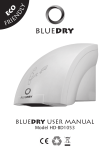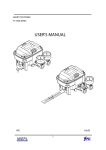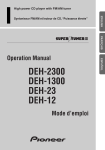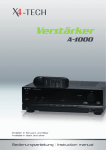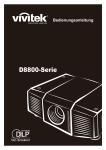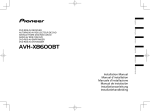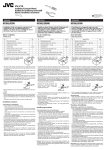Download installation manual manuel d`installation - Pioneer Europe
Transcript
Installation Note: DEH-2330R DEH-2300R DEH-2300RB DEH-1330R DEH-1300R This product conforms to new cord colors. Los colores de los cables de este producto se conforman con un nuevo código de colores. Dieses Gerät entspricht den neuen kabelfarben. Le code de couleur des câbles utilisé pour ce produit est nouveau. Questo prodotto è conforme ai nuovi codici colori. De kleuren van de snoeren van dit toestel zijn gewijzigd. Printed in Portugal Imprimé au Portugal <URD-165-A> EW <KKYLL/00G00000> MANUEL D’INSTALLATION INSTALLATION MANUAL • 5 • • 60° • • • Fig. 1 Abb. 1 Afb. 1 2 1 182 53 3 4 Fig. 2 Abb. 2 Afb. 2 Fig. 3 Abb. 3 Afb. 3 Before finally installing the unit, connect the wiring temporarily, making sure it is all connected up properly, and the unit and the system work properly. Use only the parts included with the unit to ensure proper installation. The use of unauthorized parts can cause malfunctions. Consult with your nearest dealer if installation requires the drilling of holes or other modifications of the vehicle. Install the unit where it does not get in the driver’s way and cannot injure the passenger if there is a sudden stop, like an emergency stop. The semiconductor laser will be damaged if it overheats, so don’t install the unit anywhere hot — for instance, near a heater outlet. If installation angle exceeds 60° from horizontal, the unit might not give its optimum performance. (Fig. 1) Installation with the rubber bush (Fig. 2) 1. Dashboard 2. Holder After inserting the holder into the dashboard, then select the appropriate tabs according to the thickness of the dashboard material and bend them. (Install as firmly as possible using the top and bottom tabs. To secure, bend the tabs 90 degrees.) 3. Rubber bush 4. Screw <ENGLISH> Removing the Unit (Fig. 3) Instalación Nota: • 5. Insert the supplied extraction keys into the unit, as shown in the figure, until they click into place. Keeping the keys pressed against the sides of the unit, pull the unit out. • • • • • Antes de instalar definitivamente la unidad, conecte temporalmente el cableado, asegurándose de que todo está convenientemente conectado y tanto la unidad como el sistema funcionan correctamente. Utilice únicamente los componentes que se incluyen con la unidad para garantizar una adecuada instalación. El uso de componentes no autorizados puede hacer que la unidad no funcione correctamente. Consulte a su distribuidor más próximo si la instalación requiere la perforación de orificios u otras modificaciones en el vehículo. Instale la unidad donde no estorbe al conductor y no pueda producir daños al pasajero si se produjera una parada repentina; por ejemplo una parada en una situación de emergencia. El láser del semiconductor se dañará si se sobrecalienta; por tanto, no instale la unidad en una posición en que pueda calentarse — (por ejemplo, cerca de un orificio de salida de la calefacción). Si el ángulo de instalación pasa de 60º respecto a la horizontal, el rendimiento de la unidad no será óptimo. (Fig. 1) Instalación con la arandela de caucho (Fig. 2) 1. Salpicadero 2. Soporte Una vez insertado el soporte en el salpicadero, seleccione las pestañas correspondientes según el grosor del material del salpicadero y dóblelas. (Instale la unidad lo más firme posible utilizando las pestañas inferiores y superiores. Para fijarla, doble las pestañas 90 grados.) 3. Arandela de caucho 4. Tornillo <ESPAÑOL> Retirar la unidad (Fig. 3) 5. Inserte en la unidad las llaves de extracción suministradas, como se muestra en la figura, hasta que suene un “clic” indicando que están en la posición correcta. Con las llaves presionadas contra los laterales de la unidad, tire de la unidad hacia el exterior. Einbau Hinweis: • • • • • • Schließen Sie vor dem Einbau alle Kabel vorübergehend an und kontrollieren Sie die Anschlüsse auf Richtigkeit. Überprüfen sind dann die Funktion des Geräts und Systems. Zum Einbau ausschließlich die mitgelieferten Teile verwenden, um eine korrekte Montage zu gewährleisten. Die Verwendung von Teilen anderen Ursprungs kann Störungen zur Folge haben. Falls für den Einbau Löcher zu bohren oder Änderungen am Fahrzeug vorzunehmen sind, sollten Sie zuvor Ihren Fachhändler befragen. Das Gerät an einer Stelle einbauen, wo es weder den Fahrer behindert noch den Beifahrer beim Bremsen verletzen kann. Der Halbleiterlaser wird durch Überhitzung beschädigt. Daher das Gerät keinesfalls an einer Stelle einbauen, wo es heiß werden kann, wie z. B. in der Nähe von Heizungsauslässen. Falls der Einbauwinkel 60° von der Horizontalen überschreitet, arbeitet das Gerät unter Umständen nicht optimal. (Abb. 1) Einbau mit Gummibuchse (Abb. 2) 1. Armaturenbrett 2. Einbaukonsole Nach Einführen der Einbaukonsole in das Armaturenbrett deren Haltezungen von der Dicke des Armaturenbretts hineindrücken. (Die Einbaukonsole mit den oberen und unteren Zungen sicher befestigen. Zum Sichern die Haltezunge 90° biegen.) 3. Gummibuchse 4. Schraube <DEUTSCH> Entnahme des Geräts (Abb. 3) Installation Remarque: • 5. Die beiliegenden Ausziehschlüssel entsprechend der Abbildung in das Gerät einrasten. Die Schlüssel gegen die Seiten des Geräts drücken und das Gerät herausziehen. • • • • • Avant de terminer l’installation de l’appareil, branchez temporairement les câbles en veillant à ce que tous les câbles soient correctement connectés et que l’appareil et la chaîne fonctionnent parfaitement. Utilisez uniquement les pièces fournies avec l’appareil de manière à en garantir une installation conforme. L’utilisation de pièces non autorisées peut provoquer des dysfonctionnements. Consultez votre revendeur si l’installation requiert le perçage de trous ou d’autres modifications sur le véhicule. Installez l’appareil à un endroit où il ne risque pas de gêner ni de blesser le passager en cas d’arrêt brutal, par exemple lors d’un freinage en urgence. Le laser à semi-conducteur risque d’être endommagé en cas de surchauffe; aussi, ne l’installez pas à des endroits chauds — comme à proximité d’une bouche de chauffage. Si l’angle d’installation dépasse 60° par rapport à l’horizontale, l’appareil risque de ne pas fournir de performances optimales. (Fig. 1) <FRANÇAIS> Retrait de l’appareil (Fig. 3) 5. Insérez les clés d’extraction fournies dans l’appareil comme illustré dans la figure jusqu’à ce qu’elles s’encliquettent. Tout en maintenant les clés contre les sections latérales de l’appareil, extrayez celui-ci. Installazione Nota: • • • • • • Prima di installare l’apparecchio in modo definitivo, collegare i cavi in modo provvisorio, per accertare che tutto sia collegato correttamente, e che l’apparecchio e il sistema funzionino perfettamente. Per garantire un’installazione corretta, usare solo le parti fornite insieme all’apparecchio. L’impiego di parti non approvate può causare difetti di funzionamento. Rivolgersi al rivenditore più vicino per informazioni, se l’installazione richiede l’esecuzione di fori o altre modifiche alla vettura. Installare l’apparecchio in una posizione in cui non intralci il conducente e non possa causare danni al passeggero in caso di arresto improvviso, come un arresto d’emergenza. Il laser a semiconduttore può essere danneggiato dal surriscaldamento, quindi non installare l’apparecchio in punti molto caldi — per esempio in vicinanza di una bocchetta di riscaldamento. Se l’angolo di installazione supera 60º dall’orizzontale, è possibile che l’apparecchio non fornisca le migliori prestazioni. (Fig. 1) Installation avec le manchon en caoutchouc (Fig. 2) Installazione con boccola di gomma (Fig. 2) 1. Tableau de bord 2. Support Après avoir introduit le support dans le tableau de bord, sélectionnez les pattes appropriées en fonction de l’épaisseur du matériau du tableau de bord et repliez-les. (Installez-le aussi fermement que possible à l’aide des pattes supérieure et inférieure. Pour le fixer en position, repliez les pattes de 90 degrés.) 3. Manchon en caoutchouc 4. Vis 1. Plancia 2. Supporto Dopo aver inserito il supporto nella plancia, scegliere le linguette appropriate in base allo spessore della plancia e piegarle. (Installare saldamente servendosi delle linguette superiori ed inferiori. Per fissare, piegare le linguette a 90 gradi.) 3. Boccola di gomma 4. Vite <ITALIANO> Rimozione dell’apparecchio (Fig. 3) 5. Inserire nell’apparecchio i dispositivi di estrazione in dotazione, come mostrato in figura, fino a quando s’innestano in posizione. Estrarre l’apparecchio tenendo premuti i dispositivi contro i lati e tirando.z Montage Opmerking: • • • • • • Sluit de draden tijdelijk aan en controleer of alles goed is aangesloten en het toestel en het systeem correct werken alvorens het toestel definitief te monteren. Gebruik met het oog op een degelijke montage alleen de bij dit toestel geleverde onderdelen. Het gebruik van niet-goedgekeurde onderdelen kan defecten veroorzaken. Neem contact op met uw dichtstbijzijnde handelaar als voor de montage gaten moeten worden geboord of andere wijzigingen aan het voertuig nodig zijn. Monteer het toestel op een plaats waar het de bestuurder niet kan hinderen en geen passagiers kan verwonden bij een bruuske stopbeweging, bijvoorbeeld in een noodgeval. Aangezien de halfgeleiderlaser zal worden beschadigd in geval van oververhitting, mag u het toestel niet monteren in de buurt van een warmtebron,—bijvoorbeeld dicht bij een verwarmingsuitlaat. Als het toestel wordt gemonteerd in een hoek van meer dan 60º ten opzichte van de horizontale positie, zal het toestel mogelijk niet optimaal werken. (Afb. 1) Montage met behulp van de rubberbus(Afb. 2) 1. Dashboard 2. Houder Plaats de houder in het dashboard en kies vervolgens de geschikte lipjes, overeenkomstig de dikte van het dashboardmateriaal, en buig ze. (Monteer zo stevig mogelijk met de bovenste en onderste lipjes. Om de lipjes vast te zetten, buigt u ze 90 graden.) 3. Rubberbus 4. Schroef <NEDERLANDS> Verwijderen van het toestel (Afb. 3) 5. Steek de meegeleverde uittreksleutels in het toestel, zoals getoond op de afbeelding, tot ze vastklikken. Houd de sleutels tegen de zijkanten van het toestel gedrukt en trek het toestel naar buiten. Connecting the Units <ENGLISH> Note: • 3. Antenna jack 17. Yellow/black If you use a cellular telephone, connect it via the Audio Mute lead on the cellular telephone. If not, keep the Audio Mute lead free of any connections. 2* 6. Connect leads of the same color to each other. 4* • • • 7. Cap (1*) When not using this terminal, do not remove the cap. 19. System remote control 18. Blue/white To system control terminal of the power amp (max. 300 mA 12 V DC). • 8. Yellow (3*) 9. Yellow (2*) Back-up To terminal always supplied (or accessory) with power regardless of ignition switch position. + ≠ ≠ • 25. The pin position of the ISO connector will differ depends on the type of vehicle. Connect 6* and 7* when Pin 5 is an antenna control type. In another type of vehicle, never connect 6* and 7*. 13.ISO connector Note: In some vehicles, the ISO connector may be divided into two. In this case, be sure to connect to both connectors. Fig. 4 Abb. 4 Afb. 4 AC C O ACC position F O STAR 24. Blue/white (7*) To Auto-antenna relay control terminal (max. 300 mA 12 V DC). F N 23. Blue/white (6*) • • STAR • 22. Perform these connections when using a different amp (sold separately). 14.Speaker leads White : Front left + White/black : Front left ≠ Gray : Front right + Gray/black : Front right ≠ Green : Rear left + Green/black : Rear left ≠ Violet : Rear right + Violet/black : Rear right ≠ • • 11. Red (4*) To electric terminal controlled by ignition switch (12 V DC) ON/OFF. 12. Black (ground) To vehicle (metal) body. 21.Rear speaker (Right) + • N 10. Red (5*) Accessory (or back-up) 20.Rear speaker (Left) • When this product’s source is switched ON, a control signal is output through the blue/white lead. Connect to an external power amp’s system remote control or the car’s Auto-antenna relay control terminal (max. 300 mA 12 V DC). If the car features a glass antenna, connect to the antenna booster power supply terminal. When an external power amp is being used with this system, be sure not to connect the blue/white lead to the amp’s power terminal. Likewise, do not connect the blue/white lead to the power terminal of the auto-antenna. Such connection could cause excessive current drain and malfunction. To avoid short-circuiting, cover the disconnected lead with insulating tape. Especially, insulate the unused speaker leads without fail. There is a possibility of short-circuiting if the leads are not insulated. If this unit is installed in a vehicle that does not have an ACC (accessory) position on the ignition switch, the red lead of the unit should be connected to a terminal coupled with ignition switch ON/OFF operations. If this is not done, the vehicle battery may be drained when you are away from the vehicle for several hours. OF 5* 15. Connecting cords with RCA pin plugs (sold separately). • OF 4. Fuse 1* 3* 16. Power amp (sold separately) 2. Rear output This unit is for vehicles with a 12-volt battery and negative grounding. Before installing it in a recreational vehicle, truck, or bus, check the battery voltage. To avoid shorts in the electrical system, be sure to disconnect the ≠ battery cable before beginning installation. Refer to the owner’s manual for details on connecting the power amp and other units, then make connections correctly. Secure the wiring with cable clamps or adhesive tape. To protect the wiring, wrap adhesive tape around them where they lie against metal parts. Route and secure all wiring so it cannot touch any moving parts, such as the gear shift, handbrake and seat rails. Do not route wiring in places that get hot, such as near the heater outlet. If the insulation of the wiring melts or gets torn, there is a danger of the wiring short-circuiting to the vehicle body. Don’t pass the yellow lead through a hole into the engine compartment to connect to the battery. This will damage the lead insulation and cause a very dangerous short. Do not shorten any leads. If you do, the protection circuit may fail to work when it should. Never feed power to other equipment by cutting the insulation of the power supply lead of the unit and tapping into the lead. The current capacity of the lead will be exceeded, causing overheating. When replacing fuse, be sure to use only fuse of the rating prescribed on this unit. Since a unique BPTL circuit is employed, never wire so the speaker leads are directly grounded or the left and right ≠ speaker leads are common. Speakers connected to this unit must be highpower types with minimum rating of 45 W (50 W)* and impedance of 4 to 8 ohms. Connecting speakers with output and/or impedance values other than those noted here may result in the speakers catching fire, emitting smoke, or becoming damaged. *DEH-2330R, DEH-2300R and DEH-2300RB T 5. Note: Depending on the kind of vehicle, the functio of 3* and 5* may be different. In this case, be sure to connect 2* to 5* and 4* to 3*. • T 1. This product No ACC position • The black lead is ground. Please ground this lead separately from the ground of high-current products such as power amps. If you ground the products together and the ground becomes detached, there is a risk of damage to the products or fire. • Cords for this product and those for other products may be different colors even if they have the same function. When connecting this product to another product, refer to the supplied Installation manuals of both products and connect cords that have the same function. Connection Diagram (Fig. 4) 1. 2. 3. 4. 5. This product Rear output Antenna jack Fuse Note: Depending on the kind of vehicle, the function of 3* and 5* may be different. In this case, be sure to connect 2* to 5* and 4* to 3*. 6. Connect leads of the same color to each other. 7. Cap (1*) When not using this terminal, do not remove the cap. 8. Yellow (3*) Back-up (or accessory) 9. Yellow (2*) To terminal always supplied with power regardless of ignition switch position. 10. Red (5*) Accessory (or back-up) 11. Red (4*) To electric terminal controlled by ignition switch (12 V DC) ON/OFF. 12. Black (ground) To vehicle (metal) body. 13. ISO connector Note: In some vehicles, the ISO connector may be divided into two. In this case, be sure to connect to both connectors. 14. Speaker leads White: Front left + White/black: Front left ≠ Gray: Front right + Gray/black: Front right ≠ Green: Rear left + Green/black: Rear left ≠ Violet: Rear right + Violet/black: Rear right ≠ 15. Connecting cords with RCA pin plugs (sold separately). 16. Power amp (sold separately) 17. Yellow/black If you use a cellular telephone, connect it via the Audio Mute lead on the cellular telephone. If not, keep the Audio Mute lead free of any connections. 18. Blue/white To system control terminal of the power amp (max. 300 mA 12 V DC). 19. System remote control 20. Rear speaker (Left) 21. Rear speaker (Right) 22. Perform these connections when using a different amp (sold separately). 23. Blue/white (6*) 24. Blue/white (7*) To Auto-antenna relay control terminal (max. 300 mA 12 V DC). 25. The pin position of the ISO connector will differ depends on the type of vehicle. Connect 6* and 7* when Pin 5 is an antenna control type. In another type of vehicle, never connect 6* and 7*. Conexión de las unidades <ESPAÑOL> Nota: • 3. Antenna jack 3* 2* 5* 4* 17. Yellow/black If you use a cellular telephone, connect it via the Audio Mute lead on the cellular telephone. If not, keep the Audio Mute lead free of any connections. 6. Connect leads of the same color to each other. • 7. Cap (1*) When not using this terminal, do not remove the cap. 19. System remote control 18. Blue/white To system control terminal of the power amp (max. 300 mA 12 V DC). 8. Yellow (3*) 9. Yellow (2*) Back-up To terminal always supplied (or accessory) with power regardless of ignition switch position. 10. Red (5*) Accessory (or back-up) • 20.Rear speaker (Left) 11. Red (4*) To electric terminal controlled by ignition switch (12 V DC) ON/OFF. 21.Rear speaker (Right) + + ≠ ≠ • • 24. Blue/white (7*) To Auto-antenna relay control terminal (max. 300 mA 12 V DC). • 25. • The pin position of the ISO connector will differ depends on the type of vehicle. Connect 6* and 7* when Pin 5 is an antenna control type. In another type of vehicle, never connect 6* and 7*. 13.ISO connector Note: In some vehicles, the ISO connector may be divided into two. In this case, be sure to connect to both connectors. • Fig. 4 Abb. 4 Afb. 4 F AC C O Posición ACC F O STAR 23. Blue/white (6*) • N 14.Speaker leads White : Front left + White/black : Front left ≠ Gray : Front right + Gray/black : Front right ≠ Green : Rear left + Green/black : Rear left ≠ Violet : Rear right + Violet/black : Rear right ≠ • • STAR 22. Perform these connections when using a different amp (sold separately). • N 12. Black (ground) To vehicle (metal) body. • Si la fuente de este producto está encendida (ON), se emitirá una señal de control a través del cable azul/blanco. Conéctelo al terminal de control remoto del amplificador de potencia externo o al terminal de control de relé de la antena del automóvil (máx. 300 mA 12 V CC). Si el automóvil tiene una antena de fibra de vidrio, conéctela al terminal de la fuente de alimentación del amplificador de la antena. Si utiliza un amplificador de potencia externo con este sistema, asegúrese de no conectar el cable azul/blanco al terminal de alimentación del amplificador. De igual modo, no conecte el cable azul/blanco al terminal de alimentación de la antena del automóvil. Esta conexión podría provocar un consumo excesivo de corriente y funcionar mal. Para evitar cortocircuitos, cubra el cable pelado con cinta aislante. Especialmente, no deje de aislar los cables de los altavoces que no se utilicen. Si los cables no están aislados, puede producirse un cortocircuito. Si esta unidad se instala en un vehículo que no tenga una posición ACC (accesorio) en el interruptor de encendido, el cable rojo de la unidad debe conectarse a un terminal que esté asociado con el interruptor de encendido (ON/OFF). Si no se hace así, la batería del vehículo podría descargarse si permanece varias horas fuera del vehículo. OF 4. Fuse 1* 15. Connecting cords with RCA pin plugs (sold separately). • OF 16. Power amp (sold separately) 2. Rear output Esta unidad está diseñada para vehículos con una batería de 12 voltios y toma de tierra negativa. Antes de instalarla en un vehículo recreativo, un camión o un autobús, compruebe el voltaje. Para evitar cortocircuitos, asegúrese de que desconecta el ≠ cable de la batería antes de comenzar la instalación. Consulte el manual del usuario si desea información adicional sobre el procedimiento para conectar el amplificador de potencia y las demás unidades; a continuación, haga correctamente las conexiones. Fije el cableado con mordazas para cable o cinta adhesiva. Para proteger el cableado, forre con cinta adhesiva los cables donde rocen con componentes metálicos. Dirija y fije todo el cableado de modo que no roce con ningún componente móvil (por ejemplo, la palanca de cambios, el freno de mano o los carriles de deslizamiento del asiento). No lleve el cableado por posiciones que se calienten (por ejemplo cerca de un orificio de salida de la calefacción). Si el aislamiento del cableado se funde o se rasga, podría provocar un cortocircuito en la carrocería del vehículo. No pase el cable amarillo a través de un orificio en el compartimento del motor para conectarlo a la batería. Podría dañarse el aislamiento del cable y provocar un cortocircuito muy peligroso. No acorte ningún cable. Si lo hace, el circuito de protección podría dejar de funcionar en el momento necesario. No facilite alimentación a otro equipo cortando el aislamiento del cable de la fuente de alimentación de la unidad y empalmando el cable. La capacidad de corriente del cable podría sobrepasarse, produciendo calentamiento. Cuando sustituya un fusible, asegúrese de que utiliza únicamente un fusible con el amperaje prescrito en esta unidad. Como se emplea un único circuito BPTL, no instale nunca el cableado de modo que los cables de los altavoces estén conectados directamente a tierra o que los cables de los altavoces derecho e izquierdo ≠ sean comunes. Los altavoces conectados a esta unidad deben ser de alta potencia, como mínimo de 45 W (50 W)*, y una impedancia de 4 a 8 ohmios. Si se conectan altavoces con otros valores de potencia de salida y/o impedancia que los prescritos en este manual, puede que se quemen, emitan humo o se dañen. *DEH-2330R, DEH-2300R y DEH-2300RB T 5. Note: Depending on the kind of vehicle, the functio of 3* and 5* may be different. In this case, be sure to connect 2* to 5* and 4* to 3*. • T 1. This product Sin posición ACC • El cable negro es la toma de tierra. Conecte a tierra este cable por separado; es decir, a otra toma de tierra que no sea la de los productos de alta corriente (por ejemplo los amplificadores de potencia). Si los productos se conectaran juntos a tierra y esa toma de tierra se soltara, existiría el riesgo de que se dañaran o incluso que se incendiaran. • Los cables para esta unidad y aquéllas para las unidades pueden ser de colores diferentes aun si tienen la misma función. Cuando se conecta esta unidad a otra, refiérase a los manuales de instalación de ambas unidades y conecte los cables que tienen la misma función. Diagrama de conexión (Fig. 4) 1. 2. 3. 4. 5. Esta unidad Salida posterior Toma de antena Fusible Nota: Según el tipo de vehículo, la función de 3* y 5* puede ser diferente. En este caso, asegúrese de conectar el 2* al 5* y el 4* al 3*. 6. Conecte entre sí los cables del mismo color. 7. Cubierta (1*) Cuando no utilice este terminal, no quite la cubierta. 8. Amarillo (3*) Reserva (o accesorio) 9. Amarillo (2*) Al terminal que se encuentra siempre bajo tensión, independientemente de la posición del interruptor de encendido. 10. Rojo (5*) Accesorio (o de reserva) 11. Rojo (4*) Al terminal eléctrico controlado por el interruptor de encendido (12 V CC) ON/OFF. 12. Negro (tierra) A la carrocería (metal) del vehículo. 13. Conector ISO Nota: En algunos vehículos, el conector ISO puede estar dividido en dos. En este caso, asegúrese de conectar ambos conectores. 14. Cables de los altavoces Blanco: Anterior izquierdo + Blanco/negro: Anterior izquierdo ≠ Gris: Anterior derecho + Gris/negro: Anterior derecho ≠ Verde: Posterior izquierdo + Verde/negro: Posterior izquierdo ≠ Violeta: Posterior derecho + Violeta/negro: Posterior derecho ≠ 15. Conexión de cables con enchufes de patillas RCA (vendidos por separado). 16. Amplificador de potencia (vendido por separado) 17. Amarillo/negro Si utiliza un teléfono móvil, conéctelo a través del cable Audio Mute del teléfono móvil. En caso contrario, no conecte el cable Audio Mute a ningún terminal. 18. Azul/blanco Al terminal de control del sistema del amplificador de potencia (máx. 300 mA 12 V CC). 19. Control remoto del sistema 20. Altavoz posterior (Izquierdo) 21. Altavoz posterior (Derecho) 22. Haga estas conexiones cuando utilice otro amplificador (vendido por separado). 23. Azul/blanco (6*) 24. Azul/blanco (7*) Al terminal de control de relé de la antena del automóvil (máx. 300 mA 12 V CC). 25. La posición de las patillas del conector ISO puede ser diferente según el tipo de vehículo. Conecte 6* y 7* si la Patilla 5 es de tipo control de antena. En otro tipo de vehículo, no conecte nunca 6* y 7*. Kabel dieses Geräts und die anderer Geräte können unterschiedliche Farben haben, auch wenn sie die gleichen Funktionen haben. Beim Anschluß dieses Geräts an ein anderes Gerät unter Bezugnahme auf die mit beiden Geräten mitgelieferten Installationsanleitungen die Kabel mit derselben Funktion verbinden. • • • • • • • • • • • • • Lorsque cet appareil source est commuté sur ON, un signal de commande est transmis via le fil bleu/blanc. Raccordez-le à la télécommande d’un système d’amplification de puissance externe ou à la prise de commande du relais de l’antenne de la voiture (max. 300 mA 12 V DC). Si la voiture est équipée d’une antenne intégrée dans une vitre, raccordez-le à la prise d’alimentation de l’amplificateur d’antenne. Si vous utilisez un amplificateur externe avec cet appareil, ne raccordez pas le fil bleu/blanc à la prise d’alimentation de l’amplificateur. De même, ne raccordez pas le fil bleu/blanc à la prise d’alimentation de l’antenne automatique. Une telle connexion peut entraîner une consommation de courant excessive et un dysfonctionnement. Pour éviter les courts-circuits, recouvrez le fil déconnecté de bande isolante. En particulier, isolez correctement les fils de haut-parleur inutilisés. Il y a un risque de court-circuit si les fils ne sont pas isolés. Si cet appareil est installé dans un véhicule dont le contact n’est pas doté d’une position ACC (accessoires), le fil rouge de l’appareil doit être branché sur une prise couplée avec la commutation marche/arrêt (ON/OFF) du contact. Si ce n’est pas fait, la batterie du véhicule risque de s’épuiser si vous quittez le véhicule pendant quelques heures. F AC C O Position ACC F O STAR Das schwarze Kabel ist das Erdungskabel. Dieses Kabel ist getrennt vom Masseanschluss von Hochstromgeräten wie Leistungsverstärkern zu erden. Falls die Geräte gemeinsam geerdet werden und sich der Masseanschluss lösen sollte, können Schäden an den Geräten und sogar Brand resultieren. • Cet appareil est conçu pour les véhicules équipés d’une batterie de 12 volts et d’une masse négative. Avant de l’installer dans un véhicule de loisirs, un camion ou un bus, vérifiez la tension de la batterie. Pour éviter les courts-circuits dans le système électrique, débranchez le fil de la batterie ≠ avant d’entamer l’installation. Reportez-vous au mode d’emploi pour plus de détails sur le raccordement à l’amplificateur de puissance et à d’autres appareils, puis établissez les connexions correctement. Fixez les fils à l’aide de serre-fil ou de bande adhésive. Pour protéger les fils, enroulez-les de bande adhésive aux endroits où ils sont en contact avec des pièces métalliques. Cheminez et fixez tous les fil de façon à ce qu’ils n’entrent pas en contact avec des pièces mobiles, comme le levier du changement de vitesses, le frein à main ou les rails des sièges. Ne cheminez pas les fils à des endroits chauds comme à proximité des bouches de chauffage. Si la gaine isolante des fils fond ou se déchire, les fils risquent d’être en court-circuit avec la carrosserie du véhicule. Ne faites pas passer le fil jaune par un orifice dans le compartiment moteur pour le raccorder à la batterie. Cela risque d’endommager la gaine isolante du fil et de provoquer un court-circuit très dangereux. Ne mettez aucun fil en court-circuit. Sinon, le circuit de protection risque de ne pas fonctionner lorsqu’il le devrait. N’alimentez en aucun cas un autre équipement en découpant la gaine isolante du fil d’alimentation et en puisant du courant sur le fil. La capacité de courant du fil risque d’être dépassée, provoquant ainsi une surchauffe. Lors du remplacement du fusible, utilisez uniquement un fusible de l’intensité prescrite sur cet appareil. Etant donné qu’un seul circuit BPTL est utilisé, n’établissez jamais le câblage de façon à mettre directement les fils des haut-parleurs à la masse et n’utilisez pas de fil commun pour les haut-parleurs gauche et droit ≠. Les haut-parleurs raccordés à cet appareil doivent être de type à grande puissance avec une puissance nominale minimale de 45 W (50 W)* et une impédance de 4 à 8 ohms. Le raccordement de haut-parleurs offrant une puissance de sortie et une impédance différentes des valeurs prescrites peut entraîner un début d’incendie, des émissions de fumée ou des dommages aux haut-parleurs. *DEH-2330R, DEH-2300R et DEH2300RB N • Ohne ACC-Position • STAR • O STAR ACC-Position F N • O STAR • AC C N • F Dieses Gerät Ausgang für Hecklautsprecher Antennenbuchse Sicherung Hinweis: Je nach Fahrzeug können 3* und 5* unterschiedliche Funktionen aufweisen. In diesem Fall 2* mit 5* und 4* mit 3* verbinden. 6. Kabel gleicher Farbe miteinander verbinden. 7. Kappe (1*) Diese Kappe nicht entfernen, falls der Anschluss nicht beschaltet wird. 8. Gelb (3*) Reserve (oder Zubehör) 9. Gelb (2*) An eine Klemme anschließen, an der ungeachtet der Zündschalterstellung stets Strom anliegt. 10. Rot (5*) Zubehör (oder Reserve) 11. Rot (4*) An eine Zündschalterklemme (12 V Gleichspannung) anschließen, die mit dem Ein/Ausschalten der Zündung gekoppelt ist. 12. Schwarz (Masse) An Karosserie (Metallteil) 13. ISO-Auschluß Hinweis: Bei manchen Fahrzeugen kann der ISO-Auschluß in zwei Stecker aufgeteilt sein. In diesem Fall unbedingt beide Stecker anschließen. 14. Lautsprecherkabel Weiß: Vorn links + Weiß/schwarz: Vorn links ≠ Grau: Vorn rechts + Grau/schwarz: Vorn rechts ≠ Grün: Hinten links + Grün/schwarz: Hinten links ≠ Violett: Hinten rechts + Violett/schwarz: Hinten rechts ≠ 15. Mit RCA-Stiftsteckerkabeln verbinden (getrennt erhältlich). 16. Leistungsverstärker (getrennt erhältlich) Remarque: N • 1. 2. 3. 4. 5. 17. Gelb/schwarz Bei Fahrzeugen mit Funktelefon oder Freisprechanlage mit deren Stummschaltungsanschluss oder -kabel (AUDIO MUTE) verbinden. Falls kein Funktelefon etc. installiert ist, das Stummschaltungskabel nirgendwo anschließen. 18. Blau/weiß An Systemsteuerungsanschluss des Leistungsverstärkers (max. 300 mA, 12 V Gleichspannung). 19. Systemfernsteuerung 20. Hecklautsprecher (links) 21. Hecklautsprecher (rechts) 22. Diese Anschlüsse bei Verwendung eines separaten Verstärkers (getrennt erhältlich) ausführen. 23. Blau/weiß (6*) 24. Blau/weiß (7*) An Antennenheberrelais-Steueranschluss (max. 300 mA, 12 V Gleichspannung). 25. Die Kontaktstiftbelegung von ISO-Auschluß vom Fahrzeugtyp ab. Falls Kontaktstift 5 zur Antennenhebersteuerung dient, 6* und 7* anschließen. Bei anderen Fahrzeugen 6* und 7* niemals anschließen. OF • • Anschlussplan (Abb. 4) OF • • OF • • OF • Beim Einschalten einer Programmquelle in diesem Gerät wird ein Steuersignal über das blau/weiße Kabel ausgegeben. Verbinden Sie es mit dem Fernsteuerungseingang eines Leistungsverstärkers oder mit dem Antennenheber-Steueranschluss (max. 300 mA, 12 V Gleichspannung) des Fahrzeugs. Falls das Fahrzeug mit einer Scheibenantenne ausgestattet ist, das Kabel mit dem AntennenverstärkerStromversorgungsanschluss verbinden. Falls ein separater Leistungsverstärker im System verwendet wird, sollten Sie darauf achten, dass Sie das blau/weiße Kabel nicht versehentlich an der Stromversorgungsbuchse des Verstärkers anschließen. Gleichermaßen darf das blau/weiße Kabel nicht mit dem Stromversorgungsanschluss des Antennenhebers angeschlossen werden. Solche Fehler können eine übermäßige Stromentnahme und Störungen verursachen. Zur Vermeidung von Kurzschlüssen gelöste Kabel mit Isolierband umwickeln. Unbedingt unbenutzte Lautsprecherkabel isolieren. Falls die Kabel nicht isoliert werden, besteht Gefahr von Kurzschlüssen. Falls das Gerät in ein Fahrzeug eingebaut wird, dessen Zündschalter keine ACC-Position (Nebenverbraucher) besitzt, sollten Sie das rote Kabel des Geräts an eine andere Klemme anschließen, die mit dem Ein-/Ausschalten der Zündung gekoppelt ist. Anderenfalls kann sich die Batterie bei abgestelltem Motor innerhalb weniger Stunden entladen. T • • T • Dieses Gerät ist auf Fahrzeuge mit 12-V-Batterie und negativer Erdung (Minuspol an Masse) ausgelegt. Vor dem Einbau in Wohnmobile, LKWs oder Busse die Batteriespannung prüfen. Unbedingt das Massekabel ≠ der Batterie vor der Montage abklemmen, um Kurzschlüsse im elektrischen System auszuschließen. Lesen Sie die Einzelheiten zum Anschluss des Leistungsverstärkers und anderer Komponenten in der Bedienungsanleitung bevor Sie die Anschlüsse vornehmen, um Fehler zu vermeiden. Die Kabel mit Kabelklemmen oder Klebeband sichern. Zum Schutz der Kabel sollten Sie sie an den Stellen, an denen Sie Metallteile berühren mit Klebeband umwickeln. Verlegen und befestigen Sie alle Kabel so, dass sie keine beweglichen Teile wie Schalthebel, Handbremshebel und Sitzschienen berühren. Die Kabel dürfen nicht an heiß werdenden Bereichen wie z. B. Heizungsauslässe entlanggeführt werden. Falls die Isolierung von Kabeln schmilzt oder durchgescheuert wird, besteht Gefahr von Kurzschlüssen mit der Karosserie. Das gelbe Kabel zum Anschluss an die Batterie keinesfalls durch ein Loch in den Motorraum führen. Dadurch würde die Isolierung beschädigt, was einen gefährlichen Kurzschluss zur Folge hat. Verkürzen Sie niemals Kabel. Dadurch könnte die Schutzschaltung nicht ansprechen, wenn es erforderlich ist. Niemals zur Stromversorgung anderer Geräte die Isolierung am Stromversorgungskabel des Geräts abschneiden und davon Strom abzapfen. Dadurch wird die Strombelastbarkeit des Kabels überschritten, was Überhitzung zur Folge hat. Als Ersatzsicherung dürfen nur solche mit dem vorgeschriebenen Nennwert verwendet werden. Aufgrund des speziellen BPTL-Schaltkreises dürfen Lautsprecherkabel niemals direkt geerdet oder die Minuskabel ≠ von linkem und rechtem Kanal verbunden werden. Die Lautsprecher, die an dieses Gerät angeschlossen werden, müssen auf eine Mindestnennleistung von 45 W (50 W)* und eine Impedanz von 4 bis 8 Οhm ausgelegt sein. Falls Lautsprecher mit anderen Leistungsund/oder Impedanzwerten angeschlossen werden, können die Lautsprecher in Brand geraten, Rauch entwickeln oder beschädigt werden. *DEH-2330R, DEH-2300R und DEH-2300RB <FRANÇAIS> T Hinweis: • Raccordement des appareils <DEUTSCH> T Anschließen der Geräte Pas de position ACC • Le fil noir est la masse. Raccordez ce fil à un autre point de masse que les équipements gros consommateurs de courant tels que des amplificateurs de puissance. Si vous mettez les équipements ensemble à la masse et si le fil se détache du point de masse, il y a un risque de dommages pour ces équipements voire d’incendie. • Les câbles de cet appareil et ceux d’autres appareils peuvent fort bien ne pas être de la même couleur bien que remplissant la même fonction. Pour relier cet appareil à un autre appareil, utilisez le manuel d’installation de chacun et effectuez les raccordements en ne tenant compte que de la fonction de chaque câble. Diagramme de connexion (Fig. 4) 1. 2. 3. 4. 5. Cet appareil Sortie arrière Prise d’antenne Fusible Remarque: Suivant le type de véhicule, la fonction des points 3* et 5* peut être différente. Dans ce cas, raccordez 2* à 5* et 4* à 3*. 6. Raccordez ensemble les fils de même couleur. 7. Capuchon (1*) Si vous n’utilisez pas cette prise, ne retirez pas le capuchon. 8. Jaune (3*) Réserve (ou accessoire) 9. Jaune (2*) Vers une prise alimentée en permanence, quelle que soit la position du contact. 10. Rouge (5*) Accessoire (ou réserve) 11. Rouge (4*) Vers une prise électrique contrôlée par la commutation ON/OFF du contact (12 V CC). 12. Noir (masse) Vers la carrosserie du véhicule (métal). 13. Connecteur ISO Remarque: Sur certains véhicules, le connecteur ISO peut être divisé en deux. Dans ce cas, raccordez les deux connecteurs. 14. Fils de haut-parleur Blanc: Avant gauche + Blanc/noir: Avant gauche ≠ Gris: Avant droit + Gris/noir: Avant droit ≠ Vert: Arrière gauche + Vert/noir: Arrière gauche ≠ Violet: Arrière droit + Violet/noir: Arrière droit ≠ 15. Connexion des fils dotés de fiches à broche RCA (vendus séparément) 16. Amplificateur de puissance (vendu séparément) 17. Jaune/noir Si vous utilisez un téléphone mobile, raccordezle via le fil de sourdine du téléphone. Sinon, ne raccordez pas le fil de sourdine. 18. Bleu/blanc Vers la prise de commande système de l’amplificateur de puissance (max. 300 mA 12 V CC). 19. Télécommande système 20. Haut-parleur arrière (gauche) 21. Haut-parleur arrière (droit) 22. Exécutez ces connexions si vous employez un autre amplificateur (vendu séparément). 23. Bleu/blanc (6*) 24. Bleu/blanc (7*) Vers la prise de commande du relais de l’antenne (max. 300 mA 12 V CC). 25. La position de la broche du connecteur ISO diffère suivant le type de véhicule. Raccordez 6* et 7* si la broche 5 est une broche de commande d’antenne. Sur un autre type de véhicule, ne connectez jamais 6* et 7*. • • • • • • • • • • • • • • Wanneer de bron van dit toestel wordt ingeschakeld, wordt een besturingssignaal uitgevoerd via de blauw/witte kabel. Sluit hem aan op het aansluitpunt van de systeemafstandsbediening van een externe vermogensversterker of op het besturingsaansluitpunt van het relais van de automatische antenne (max. 300 mA 12 V gelijkstroom). Als de auto een ruitantenne heeft, sluit de kabel dan aan op het voedingsaansluitpunt van de antenneversterker. Wanneer u samen met dit toestel een externe vermogensversterker gebruikt, mag u de blauw/witte kabel niet aansluiten op de voedingsaansluiting van de versterker. De blauw/witte kabel mag evenmin worden aangesloten op de voedingsaansluiting van de automatische antenne. Dit zou immers kunnen leiden tot een overmatig stroomverbruik en storingen. Wikkel, om kortsluiting te voorkomen, isolatietape rond de losgemaakte kabel. Vooral de ongebruikte luidsprekerkabels moeten absoluut worden geïsoleerd. Niet-geïsoleerde kabels kunnen kortsluiting veroorzaken. Als dit toestel wordt gemonteerd in een voertuig waarvan de contactschakelaar geen ACC-positie heeft (accessoires), moet de rode kabel van het toestel worden aangesloten op een aansluitpunt dat gekoppeld is aan de ON/OFF-stand van de contactschakelaar. Zo niet kan de accu leeg raken wanneer u het voertuig een paar uur achterlaat. F AC C O ACC-positie F O STAR I cavi per questo apparecchio e quelli per altri apparecchi possono avere colori diversi, pur svolgendo la stessa funzione. Per il collegamento di questo apparecchio ad un’altro, vedere i manuali di installazione di entrambi gli apparecchi, e provvedere al collegamento dei cavi aventi la stessa funzione. • Dit toestel is ontworpen voor voertuigen met een accu van 12 volt met negatieve aarding. Controleer de accuspanning voordat u het toestel monteert in een kampeerauto, vrachtwagen of bus. Om kortsluitingen in het elektrisch systeem te voorkomen, moet u vóór de montage de massakabel ≠ van de accu loskoppelen. Zie de gebruiksaanwijzing voor details m.b.t. het aansluiten van de vermogensversterker en andere apparaten en maak de aansluitingen zoals het hoort. Maak de draden vast met kabelklemmen of kleefband. Bescherm de draden door er kleefband rond te wikkelen op plaatsen waar ze in contact komen met metalen delen. Leid en bevestig alle draden zodanig dat ze niet in aanraking kunnen komen met bewegende delen, zoals de versnellingshendel, de handrem en de geleiderails van stoelen. Laat geen draden lopen op plaatsen die warm kunnen worden, bijvoorbeeld dicht bij de uitlaat van de verwarming. Als de draadisolatie smelt of doorscheurt, bestaat er gevaar voor kortsluiting van de draad naar de carrosserie. Steek de gele kabel niet door een gat in het motorcompartiment om hem aan te sluiten op de accu. Dit zal beschadiging van de kabelisolatie en een zeer gevaarlijke kortsluiting veroorzaken. Veroorzaak geen kortsluiting tussen kabels. Anders zal het beveiligingscircuit mogelijk niet werken wanneer dit nodig is. Voorzie nooit andere apparaten van stroom door de isolatie van de voedingskabel door te snijden en stroom van de voedingskabel af te tappen. Zo zou de stroomcapaciteit van de kabel worden overschreden, met oververhitting tot gevolg. Vervang de zekering uitsluitend door een zekering die de op dit toestel vermelde voorgeschreven stroomsterkte heeft. Daar gebruik wordt gemaakt voor een uniek BPTL-circuit, mag u de luidsprekerkabels nooit rechtstreeks met massa verbinden en mag geen gemeenschappelijke massakabel ≠ worden gebruikt voor de linker- en rechterluidsprekers. De op dit toestel aangesloten luidsprekers moeten hoogvermogensluidsprekers zijn met een minimaal uitgangsvermogen van 45 W (50 W)* en een impedantie van 4 tot 8 ohm. Wanneer luidsprekers worden aangesloten met andere dan de voorgeschreven vermogens- en/of impedantiewaarden, kunnen de luidsprekers vuur vatten, rook afgeven of beschadigd worden. *DEH-2330R, DEH-2300R en DEH-2300RB N Il cavo nero è la massa. Collegare a massa questo cavo separatamente dalla massa di componenti a forte assorbimento di corrente, quali gli amplificatori esterni. Se i componenti sono collegati insieme e la massa si stacca, esiste il rischio di danni agli apparecchi o di incendio. • STAR • Nessuna posizione ACC Quest’apparecchio Uscita posteriore Connettore d’antenna Fusibile Nota: Secondo il tipo di veicolo, la funzione di 3* e di 5* può essere diversa. In tale caso, fare attenzione a collegare 2* a 5* e 4* a 3*. 6. Collegare tra loro i cavi con lo stesso colore. 7. Cappuccio (1*) Quando non si usa questo terminale, non rimuovere il cappuccio. 8. Giallo (3*) Riserva (o accessorio) 9. Giallo (2*) A terminali sempre sotto tensione, indipendentemente dalla posizione del blocchetto di accensione. 10. Rosso (5*) Accessorio (o riserva) 11. Rosso (4*) A terminali comandati dal blocchetto di accensione (12 V c.c.) ON/OFF. 12. Nero (massa) Alla carrozzeria del veicolo (metallo). 13. Connettore ISO Nota: In alcuni veicoli il connettore ISO può essere diviso in due. In tale caso, fare attenzione a collegare entrambi i connettori. 14. Cavi degli altoparlanti Bianco: Anteriore sinistro + Bianco/nero: Anteriore sinistro ≠ Grigio: Anteriore destro + Grigio/nero: Anteriore destro ≠ Verde: Posteriore sinistro + Verde/nero: Posteriore sinistro ≠ Viola: Posteriore destro + Viola/nero: Posteriore destro ≠ 15. Cavi di collegamento con connettori RCA (acquisto separato). 16. Amplificatore esterno (acquisto separato) Opmerking: N • O STAR Posizione ACC F N • O STAR • AC C N • F 1. 2. 3. 4. 5. 17. Giallo/nero Se si usa un telefono cellulare, collegarlo tramite il cavo di silenziamento audio del telefono cellulare. Altrimenti, lasciare il cavo di silenziamento audio non collegato. 18. Blu/bianco Al terminale di comando sistema dell’amplificatore esterno (massimo 300 mA 12 V c.c.). 19. Telecomando del sistema 20. Altoparlante posteriore (sinistro) 21. Altoparlante posteriore (destro) 22. Eseguire questi collegamenti se si usa un amplificatore diverso (acquisto separato). 23. Blu/bianco (6*) 24. Blu/bianco (7*) Al terminale di comando relè dell’antenna automatica (massimo 300 mA 12 V c.c.). 25. La posizione dei pin del connettore ISO è diversa secondo il tipo di veicolo. Collegare 6* e 7* quando il Pin 5 è un tipo di comando antenna. In altri tipi di veicoli, non collegare mai 6* e 7*. OF • • Schema di collegamento (Fig. 4) OF • • OF • OF • • Quando la fonte dell’apparecchio è attivata, viene inviato un segnale di comando attraverso il cavo blu/bianco. Collegarlo al telecomando dell’amplificatore esterno o al terminale di comando relè dell’antenna automatica della vettura (massimo 300 mA 12 V c.c.). Se la vettura è dotata di antenna a cristallo, collegarlo al terminale di alimentazione dell’amplificatore d’antenna. Se nel sistema è usato un amplificatore esterno, fare attenzione a non collegare il cavo blu/bianco al terminale d’alimentazione dell’amplificatore. Analogamente, non collegare il cavo blu/bianco al terminale di alimentazione dell’antenna antenna automatica. Un siffatto collegamento potrebbe causare eccessivo assorbimento di corrente e un funzionamento non corretto. Per evitare cortocircuiti, coprire con nastro isolante il cavo staccato. In particolare, isolare sempre i cavi degli altoparlanti non usati. Se i cavi non sono isolati, esiste il rischio di cortocircuiti. Se quest’apparecchio è installato su una vettura non dotata di posizione ACC (accessori) sul blocchetto di accensione, il cavo rosso dell’apparecchio deve essere collegato ad un terminale associato con le operazioni ON/OFF del blocchetto di accensione. Se non si opera in questo modo, la batteria del veicolo può scaricarsi se si rimane lontani dal veicolo per molte ore. T • • T • Quest’apparecchio è previsto per vetture con batteria da 12 volt e massa negativa. Prima di installarlo su un veicolo da turismo, autocarro, o autobus, controllare la tensione della batteria. Per evitare cortocircuiti nell’impianto elettrico, assicurarsi che il cavo ≠ della batteria sia staccato prima di cominciare l’installazione. Fare riferimento al manuale d’uso per dettagli sul collegamento dell’amplificatore e degli altri apparecchi, poi collegarli correttamente. Fissare i cavi con fascette o con nastro adesivo. Per proteggere i cavi, avvolgere del nastro adesivo nei punti in cui si appoggiano contro parti metalliche. Instradare e fissare tutti i cavi in modo che non possano toccare parti in movimento, quali la leva del cambio, il freno di stazionamento e le rotaie dei sedili. Non instradare i cavi in posti che possano diventare caldi, come in vicinanza delle bocchette di riscaldamento. Se l’isolamento dei cavi fonde o si usura, esiste il pericolo di cortocircuiti verso la carrozzeria del veicolo. Non far passare il cavo giallo nel vano motore attraverso un foro per collegare la batteria. Questo danneggia l’isolamento de cavo e può causare un cortocircuito molto pericoloso. Non cortocircuitare nessuno dei cavi. Altrimenti è possibile che il circuito di protezione non funzioni correttamente in caso di necessità. Non alimentare mai altri apparecchi tagliando l’isolamento del cavo d’alimentazione dell’apparecchio e prelevando corrente dal tale cavo. Può essere superata la corrente consentita nel cavo, con conseguente surriscaldamento. Quando si sostituisce il fusibile, accertare che il fusibile usato abbia il valore nominale previsto per l’apparecchio. Poiché viene impiegato uno speciale circuito BPTL, non collegare mai i cavi degli altoparlanti direttamente a massa oppure i cavi ≠ dell’altoparlante di sinistra e di quello di destra in comune. Gli altoparlanti collegati all’apparecchio devono essere di grande potenza con un valore nominale minimo di 45 W (50 W)* e un’impedenza da 4 a 8 ohm. Se si collegano altoparlanti con valori di potenza e/o impedenza diversi da quelli indicati, è possibile che gli altoparlanti prendano fuoco, producano fumo, o siano danneggiati. *DEH-2330R, DEH-2300R e DEH-2300RB <NEDERLANDS> T Nota: • Aansluiten van de toestellen <ITALIANO> T Collegamento degli apparecchi Geen ACC-positie • De zwarte kabel is de massakabel. Verbind deze kabel met een afzonderlijk massapunt, d.i. een ander massapunt dan voor de toestellen met hoge stroomsterkte, zoals vermogensversterkers. Als u de toestellen met één gemeenschappelijk massapunt verbindt, bestaat er gevaar voor beschadiging van de toestellen of brand wanneer de massa wordt losgekoppeld. • Snoeren voor dit toestel en overeenkomende snoeren voor andere toestellen hebben mogelijk verschillende kleuren ookal is de functie van de snoeren hetzelfde. Zie voor het verbinden van dit toestel met een ander toestel daarom de installatiehandleiding van beide toestellen en verbind de snoeren met dezelfde functie met elkaar. Aansluitschema (Afb. 4) 1. 2. 3. 4. 5. Dit toestel Achterste uitgang Antenneaansluiting Zekering Opmerking: Afhankelijk van het type van voertuig, kan de functie van 3* en 5* verschillen. Sluit in dit geval 2* op 5* en 4* op 3*. 6. Sluit kabels met dezelfde kleur op elkaar aan. 7. Kapje (1*) Verwijder het kapje niet wanneer u dit aansluitpunt niet gebruikt. 8. Geel (3*) Reserve (of accessoire) 9. Geel (2*) Op aansluitpunt dat altijd van stroom wordt voorzien, ongeacht de stand van de contactschakelaar. 10. Rood (5*) Accessoire (of reserve) 11. Rood (4*) Op elektrisch aansluitpunt dat geregeld wordt door de ON/OFF-stand van de contactschakelaar (12 V gelijkstroom). 12. Zwart (massa) Op carrosserie (metaal). 13. ISO-connector Opmerking: Bij sommige voertuigen bestaat de ISO-connector uit twee delen. In dat geval moet u beide connectors aansluiten. 14. Luidsprekerkabels Wit: Links voor + Wit/zwart: Links voor ≠ Grijs: Rechts voor + Grijs/zwart: Rechts voor ≠ Groen: Links achter + Groen/zwart: Links achter ≠ Paars: Rechts achter + Paars/zwart: Rechts achter ≠ 15. Aansluiten van kabels met RCA-penstekkers (los verkocht). 16. Vermogensversterker (los verkocht) 17. Geel/zwart Wanneer u een cellulaire telefoon gebruikt, sluit u deze via de audiodempingskabel op de cellulaire telefoon aan. Zo niet houdt u de audiodempingskabel vrij voor andere aansluitingen. 18. Blauw/wit Naar het systeembesturingsaansluitpunt van de vermogensversterker (max. 300 mA 12 V gelijkstroom). 19. Systeemafstandsbediening 20. Achterste luidspreker (links) 21. Achterste luidspreker (rechts) 22. Maak deze aansluitingen bij gebruik van een andere versterker (los verkocht). 23. Blauw/wit (6*) 24. Blauw/wit (7*) Op het besturingsaansluitpunt van het relais van de automatische antenne (max. 300 mA 12 V gelijkstroom). 25. De positie van de pennen van de ISO-connector verschilt afhankelijk van het type van voertuig. Sluit 6* en 7* aan wanneer pen 5 voor antennebesturing is. Sluit 6* en 7* nooit aan in een ander type van voertuig.







